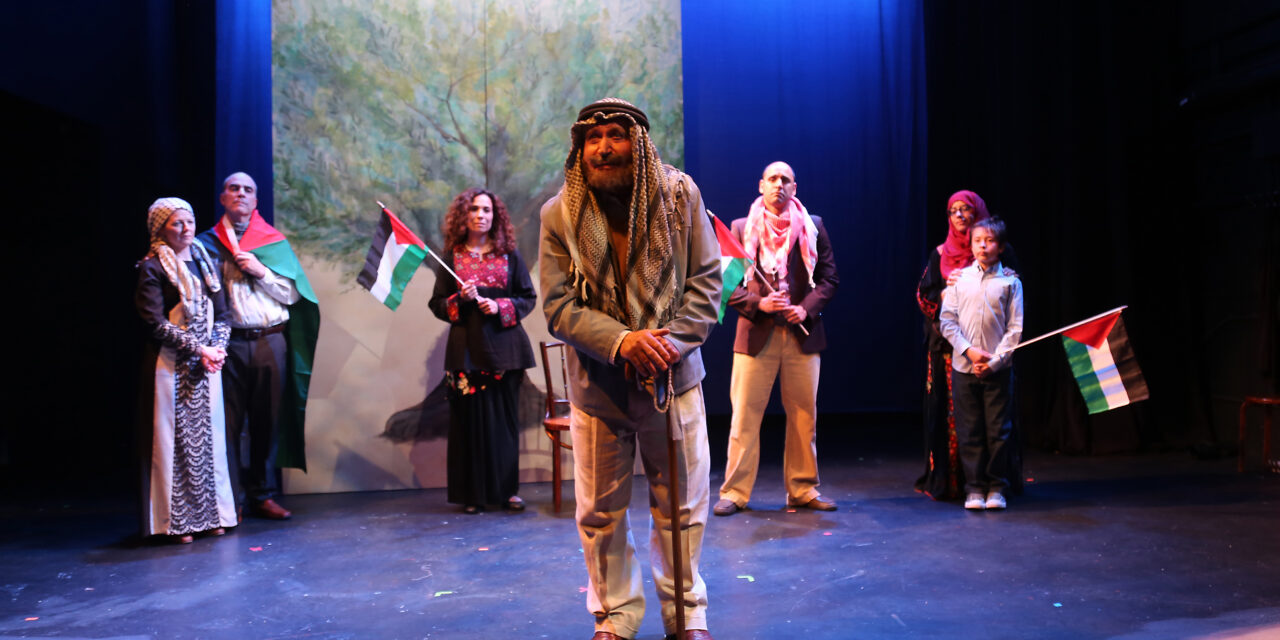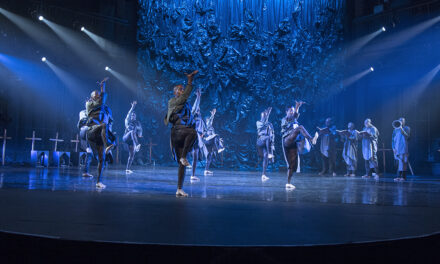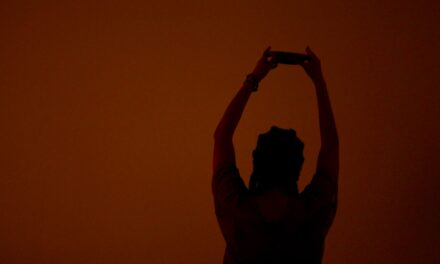Scenes from 71* Years is a play of remembrance showing a diasporic perspective on the Palestinian situation constructed from a site of exile in the U.K. It deserves to be widely seen and discussed. Golden Thread Productions’ artistic director, Torange Yeghiazarian, has done San Francisco audiences a service in bringing to the Bay this complex docu-style drama written by Hannah Khalil, an Irish Palestinian author who lives in London and directed by Michael Malek Najjar, a Lebanese American who teaches theatre at the University of Oregon.[1] The performance I saw was followed by an audience discussion. Such work demands not just a post-show discussion but also (for those like myself who lack grounding in Middle Eastern history) additional research into the when and where. I needed to Google al-Nakba Day’s background (May 15 remembrance of the Catastrophe / 1948 / beginning of Israel, a day of commemoration introduced by Yasser Arafat in 1998 that has grown in popularity since then). As a reviewer, I am still working on what was going on politically in the years that were most frequently cited: 1948 (declaration of the State of Israel / Nakba / the Catastrophe), 1967 (Six-Day War), 1987–93 (First Intifada), 2002–5 (Second Intifada), 2008–11 (Free Gaza Movement), and so forth.
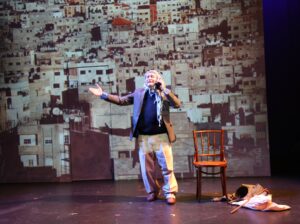
Dress Rehearsal, Photo copyright Najib Joe Hakim.
While the scene structure pulls the viewer back and forth between 1948 and 2016, there is no chronological sequencing. The script primarily seeks realism and fuller representation of the Palestinian experience. Small slices of life in 31 scenes created the 90-minute performance played without intermission: (1948) a doctor teaches young men how to bandage using his son (who longs to join the fighting) as the model; (2003) a grocer sells onions which can alleviate responses to tear gas at a high price; (1992) two women tease a soon-to-be-married girlfriend during a beach picnic and are harassed by two Israeli soldiers on patrol; (2005) a Palestinian visits the home of his youth, which has since been occupied by an Israeli settler; (2016) a young woman, Rula – who in another scene declares herself a Palestinian Banksy creating graffiti protests – Skypes with her London cousin, hesitating to ask for a no-longer-needed iPhone as the cousin thinks she is asking to come to the UK;[2] (2002) a Jewish taxi driver deals with the general craziness of who can go where and when without being attacked or blocked.
The play forms a patchwork of memories of community members of all ages. A cast of nine switches from character to character throughout, moving from persecuted to persecutor via lightning changes that costume designer Brooke Jennings orchestrated to differentiate the many roles, few of which have names. A green tree-of-life image by set designer Mikiko Uesugi adorns the closed screen at the back of the stage when we first enter, and the same tree appears again at the end when we remember a pre-1948 flourishing village. But when opened, the screen is for digital projections – often a war zone or graffiti-filled barrier wall. The year and the stark images of conflict set the stage. These effective projections by Erin Gilley are the only clues to situate the viewer aside from a table or chair. Lights were by Cassie Barnes and sound by James Ard, and both served well. Time zips back and forth: the repeated image of an armed Israeli soldier questioning the protagonist(s), either as an active participant in the dialogue in the particular scene or just looming as long lines of people wait to cross a checkpoint. The military presence was the constant feature – borders stop and oppress. Barriers affect both sides and prevent the Palestinian protagonists from getting home. In this play, no one ever arrives.
The author attempts to humanize both sides – in the opening episode, a grocer (Afifi Houssain) and Israeli soldier (Adam El-Sharkawi) move from the guarded and guard to sharing a cool drink, despite the grocer’s shipment of supplies being caught at a checkpoint. Both sides want an amicable relationship, but their roles divide them. They can only momentarily relax.
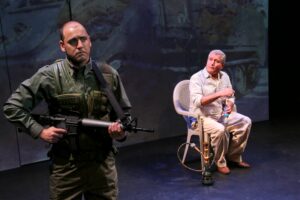
— Scenes from 71* Years. Photo copyright Najib Joe Hakim.
Perhaps the two most developed scenes of the play are two dinner interludes. There is a Jewish family circa 2010 trying to get their recalcitrant, vegetarian, and Israeli-media-questioning teen daughter to go to study in England. In a parallel scene, a vocal Palestinian woman harangues her college-aged son for daring to think about escaping to study or live in the U.K.
“I am not going to Oxford, I am going to the West Bank to see for myself” (p. 59),[3] declares the Jewish daughter (played by Marisa Darabi) as she squabbles with her yarmulka-wearing father (Lawrence Radecker). The father says he will send the envelope himself – Oxford is near for the parents, the West Bank or Gaza way too far. In the second scene, a college-going son (Dean Koya) admits to his mother (Ayla Yarkut) that he has a Skype interview set up with the University of London. She excoriates him – if he goes, “All the years of hardship, being murdered, imprisoned, having homes taken, . . . . everything we have endured has been for nothing”; she will do all she can to prevent him from leaving, even as he bursts out: “This is suffocating me” (p. 78). I suspect everyone in Golden Thread’s 82-seat house wanted to get both these young people out to do writing and activism from the safer place of diasporic critique, which the author and we inhabit.
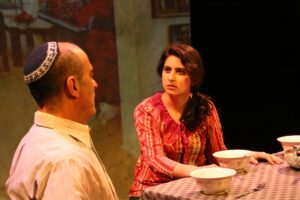
— Scenes from 71* Years. Photo copyright Najib Joe Hakim.
This no-exit history was dense and challenging to contemplate. The play concluded with a (2002/present)[4] scene of the Nakba remembrance when people return to sites of their home village. The oldest man (Abu Zaman [abu, “father,” zaman, “time”]) was called upon to detail the atrocities that ended the community’s life in 1948. Abu Zaman was played by actor Afifi Houssain, who, as the program noted, was born in 1954 into a Palestinian family that had lost his aunt in the Nakba. In front of the flowering tree, Abu Zaman told of the tribulation, and the group demanded that a young boy, Kamil (kamil, “perfect one,” played by a preteen Kal’el Lopez), repeat the events detail by detail – killing, division of the men from the women and children, expulsion, and wandering as the dispersed community “began the walk home.”
As the boy and play conclude, that village is “still walking” (p. 84).
Each scene was executed with energy. Many rang true. Circa 2010 an American aid worker protests that canned fruit, chocolate, toys, and salt are stripped from her shipment of supplies to the Palestinians. In 2011 a schoolboy must travel alone to visit his father since his mother cannot get through the checkpoint. Yet some scenes made me ponder – for 1992 three women on the beach after multiple passes by a patrol actually yell at armed soldiers, and one jumps up and fights as all are bashed. Don’t women zip mouths and clear out picnics when guns and repeated harassment by military men are the order of the day; do they wait for a third pass? This seemed a scene played from the safe distance of a Western dramatic perspective rather than in the moment of war-zone life.

— Scenes from 71* Years. Photo copyright Najib Joe Hakim.
This script reminded me of family memory pieces that in the 1980s my Jewish students were constructing from oral histories of parents’ and grandparents’ Holocaust experiences. The second generation wanted to know what the first generation had not been willing to share previously. I was also reminded of creating a theatre version of Jeannie Wakatsuki Houston’s autobiography (Farewell to Manzanar) on the Japanese American internment experience to which we added the 1980s reparations movement led by sansei (third-generation) descendants of internees: my University of California Santa Cruz students presented the play at a Bay Area Buddhist Temple and internment camp events in the early 1990s. Student actors were stunned as older Japanese Americans would approach them after the show, saying, “You played me in that Senate reparation hearing scene” or “I was that 442nd Regiment soldier from the Battle of the Bulge that you quoted.” Memory productions come from lived histories, but, while played from the distance of time or space, they make us all confront the past.
Scenes from 71* Years is a history play about scar tissue. Cast, crew, and audience were working hard to look at stories of suffering and resilience – to witness. Author Khalil noted that at SOAS in London she heard a Paris-based Israeli filmmaker present his “Toward a Common Archive” project which gathered both Palestinian and Israeli video testimonies of 1948 and that his project had inspired her first play about Palestine (Plan D, which examined the house seizures of that era).[5] In Plan D, Khalil used the more conventional realistic mode of a single family’s experience. As others approached her after seeing that show, she worked the current piece to try and tell more narratives, developing this script, which in 2010 was reading as Scenes from 62 Years but took six more years before its first full staging as Scenes from 68* Years (Alacola Theatre, April 2016).
That London production met with mixed reviews: Jo Caird found the temporal and geographic jumps confusing, despite recurring characters.[6] Dave Fargnoli, by contrast, praised the play: “A remarkable piece of writing made outstanding by a dynamic production.”[7]
Khalil seems to be developing a career that asks audiences to look at histories of pain and injustice. She is not confined to the Palestinian issue: The Scar Test (2017)[8] was a docudrama on female asylum seekers in England who can, ironically, only prove the legitimacy of their suit via actual marks on their skin. Her BBC 4 radio work, Deportation Room (2012), dealt with Gazans’ treatment at the Cairo airport, and Last of the Pearl Fishers (2015) recounts the disappearance of a Filipino maid in Dubai, where abuse or even murder of Southeast Asian domestics is all too mundane. Khalil takes on the world’s problems and is especially dedicated to giving roles and voices to women. She goes beyond the Mideast-British connections but has given such themes special attention.
Golden Thread Productions took on the challenge of mounting this script that might make other theatres nervous in the current American climate, with its rise of anti-Semitism. During the post-show discussion, artistic director Yeghiazarian noted that the subject made this piece harder for fundraising and getting the word out. We understand why: the day before I saw the show, yet another synagogue was attacked, this time in San Diego: one killed and three wounded. Though funders may fear it, productions like this help by bringing underlying issues to the fore. Scenes from 71* Years is necessary theatre. It deserves additional productions and discussions and invites viewers to interrogate.
Kathy Foley is a Professor of Theater Arts at the University of California Santa Cruz and was the editor of Asian Theatre Journal from 2004–2018. She is the current president of UNIMA-USA (Union Internationale de la Marionnette) and serves on the UNIMA-International Research Commission and Publication and Research Commission.
Notes
[1] A clip of the play in rehearsal in San Francisco with statements by director Michael Malek Najjar is available at https://www.goldenthread.org/2019-season/scenes/ (accessed 3 May 2019). Rehearsals circa 2016 from the London premiere with comments by the author and British director Chris Waters can be seen in “Play about Life under Occupation Staged in London,” 17 November 2016 (18 April 2016), https://www.youtube.com/watch?v=_q_w0mxNNbU (accessed 3 May 2019). For Khalil’s other work, her short play Bitterenders appeared in Arab Stages, Volume 1, Number 2 (Spring 2015), https://arabstages.org/2015/04/bitterenders/ (accessed 3 May 2019). Her Plan D is in Inside/Outside: Six Plays from Palestine and the Diaspora, ed. Naomi Wallace and Ismail Khalidi, NY: Theatre Communications Group, 2015. More recently, Metaverse was part of a program with two other authors on VR-themed works at the National Theatre of Scotland in Glasgow in March 2019, and upcoming is A Museum in Baghdad, one of the RSC’s mainstage shows for 2019, which deals with Gertrude Bell’s work at the Baghdad Archeological Museum circa 1926 and Ghalia Hussein’s reopening of the institution in 2006 (see https://www.rsc.org.uk/a-museum-in-baghdad/ (accessed 3 May 2019).
[2] This scene was done via Skype with a Palestinian actress Skyping in from the Middle East for the London premiere but instead used two onstage actresses in San Francisco.
[3] All quotes are taken from Hannah Khalil, Scenes from 68* Years, London; New York: Bloomsbury, 2016. The play under the title of Scenes from 70* Years, with a short introduction by Najjar and a statement by Khalil (see pp. 45–90), is also included in Michael Malek Najjar and Corey Pond, eds., Six Plays of the Israeli-Palestinian Conflict, Jefferson, NC: McFarland.
[4] I wondered whether the choice of the date 2002 had to do with the founding of the reconciliation group Zochrot by Eitan Bronstein and a London commemoration of Nakba in 2002. See https://zochrot.org/en (accessed 3 May 2019).
[5] For information on this effort, see https://eyalsivan.info/index.php?p=elements1&id=6#&panel1–7 (accessed 3 May 2019). For how a seminar at the School of Oriental and African Studies on Oral Histories of Palestine helped Khalil begin researching stories of ordinary people’s experiences, see “How Skype Helped Me Tell Palestine’s Story on Stage,” The National: Opinion, https://www.thenational.ae/opinion/how-skype-helped-me-tell-palestine-s-story-on-stage-1.222856 (accessed 3 May 2019).
[6] Jo Caird, “Scenes from 68* Years (Arcola Theatre),” 12 April 2016, What’s OnStage, https://www.whatsonstage.com/london-theatre/reviews/scenes-from-68-years-arcola_40172.html (accessed 3 May 2019)
[7] Dave Fargnoli, “Review: Scenes from 68* Years at the Arcola,” 30 April 2016, http://exeuntmagazine.com/reviews/review-scenes-from-68-years-at-the-arcola/ (accessed 3 May 2019).
[8] For clips from this project, see “Rear Window: The Scar Test,” at https://www.youtube.com/watch?v=f2ak3G7rd7g (accessed 3 May 2019).
This post was written by the author in their personal capacity.The opinions expressed in this article are the author’s own and do not reflect the view of The Theatre Times, their staff or collaborators.
This post was written by Kathy Foley.
The views expressed here belong to the author and do not necessarily reflect our views and opinions.

